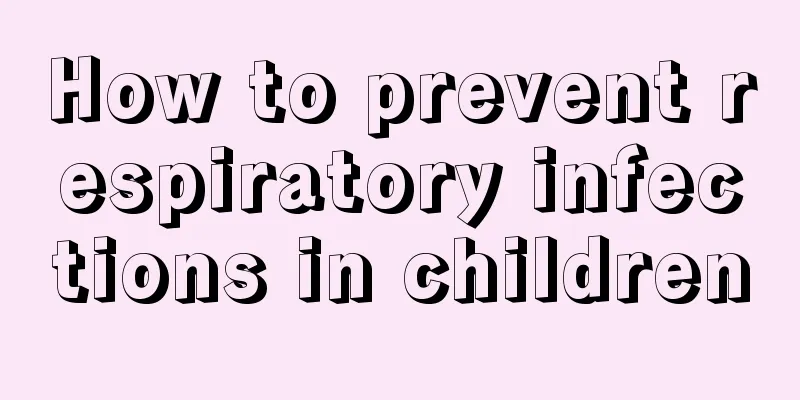How to prevent respiratory infections in children

|
Children are the apple of their parents' eyes, the continuation of their parents' lives, and little teachers who help their parents grow. Children's health is of greatest concern to every family, but some diseases are hard to prevent when children are in a large environment, especially in public places such as kindergartens when diseases are prevalent. If one child has a problem, it can be transmitted to multiple babies. As parents, how should we prevent respiratory infections in children when epidemics are prevalent? Promote breastfeeding. Breast milk is the most ideal natural food for babies and contains various nutrients. Breast milk contains a large amount of immunoglobulins, immune cells, lysozyme, lactoferrin, etc., which help to enhance the baby's ability to resist infection. In particular, colostrum, which is initially secreted after delivery, is rich in antibodies and trace elements, especially SIGA, which helps prevent respiratory and gastrointestinal infections. Therefore, breastfed children are generally less likely to catch colds. Physical exercise is beneficial to strengthening children's physique and improving their ability to defend against diseases. In addition to physical activities, you can also make full use of air, sunlight, and water for exercise; for example, sleeping with the window open allows children to breathe in cooler and fresh air, which can clear the upper respiratory tract mucosa and increase respiratory resistance. After the child is accustomed to sleeping with the window open, you can further implement outdoor sleeping. Encourage your children to participate in outdoor activities and get more sunshine. Take a bath with warm water, or wash your hands, face, feet, etc. with cold water. On this basis, gradually carry out three-bath exercises (sunbath, water bath, air bath) to achieve better results. Increasing nutrition and obtaining various nutrients necessary for the human body can help improve children's immunity. Regular vaccinations, such as those for measles, whooping cough, rubella, etc., can effectively improve children's immunity to these respiratory infectious diseases, thereby cutting off the spread of these respiratory infectious diseases among the population. Babies are relatively small and their immune systems are not as strong as adults. When diseases are prevalent, try not to take your baby to places where there are large crowds and poor air circulation, such as shopping malls, theaters, etc. Take your baby to parks and other places often to exercise and get more sun. If your baby is sick, do not take him to kindergarten to avoid cross-infection, which will not only make other children sick but also worsen the baby's own condition. You can give your baby some fungus and other foods to clear the lungs, and you can also give your baby some Chinese medicine for prevention. |
<<: What will happen to a two-month-old baby?
>>: What are the reasons for white ringworm on children's faces in spring?
Recommend
Why do premature babies always strain?
Premature babies are more likely to show signs of...
Treatment for children crying at night
Children's crying at night often makes us par...
At what age is it normal for children to lose their teeth?
We know that people will experience tooth replace...
How to treat baby heat rash
The baby's body is relatively weak. When many...
Clinical manifestations of ulcers at the corners of the mouth in children
Children are the hope of the family and the flowe...
What causes night terrors in children?
Night terrors are a common symptom among babies. ...
What to do if big red bumps appear on baby's body
The baby's physical health is one of the most...
One year old baby keeps drooling
If a one-year-old baby is drooling all the time, ...
Causes and treatments of yellow water discharge from newborn ears
For a family, a newborn baby marks the beginning ...
Is MRI harmful to children?
Magnetic resonance imaging is a relatively common...
Standard measurement method for height and weight of one-year-old baby
After the birth of a child, parents are very worr...
Calcium supplement for 6-year-old children
Babies are about to enter the growth stage at the...
How to correct a child's hunchback
Some children have hunchbacks, and their parents ...
What causes dizziness in children?
In the process of taking care of children, many p...
Is a baby fence necessary?
When a child comes into this world from his mothe...









